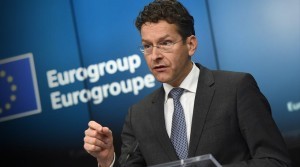Athens and its creditors are discussing the “ready additional measures” Greece will take in 2018 when the Greek bailout program ends, according to Eurogroup President Jeroen Dijsselbloem, who has clarified that they will go quite far back and be both “few and measured. ”
While Athens awaits debt relief from Eurogroup on December 5, the Dutch Finance Minister has announced that reducing the surplus below 3.5% of the GDP is not anticipated to begin in 2019, but perhaps several years later, when the creditors see fit. According to Bloomberg, Jeroen Dijsselbloem said in an interview from Malta that the institutions, the IMF and the government have laid out the measures for 2018.
While Dijsselbloem stressed that the institutions would submit their report to Eurogroup in December, and that “tremendous progress has been made,” he mentioned nothing about the prospect of reaching an agreement ahead of the Eurogroup meeting.
Dijsselbloem has also dashed Greece’s hope for substantial debt relief, at least the way the IMF had wanted, saying that “the long term (the surplus target) can be reduced a bit more, and this, yes, this is truly a realistic approach.” In other words, the European creditors agree to a small easing of Greece’s debt after 2018, but that it might take a little time or even years to start.
As Mr. Dijsselbloem said: “We are standing by the Greek people and will help them manage their debt,” but that in order to do so would depend on “if and when the Greeks fulfill the terms of the program, and on this basis the IMF could also continue participating in it as well.”
Ask me anything
Explore related questions





